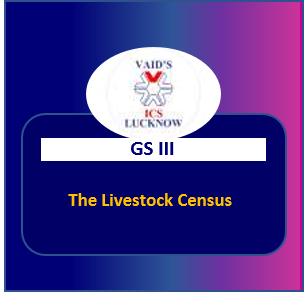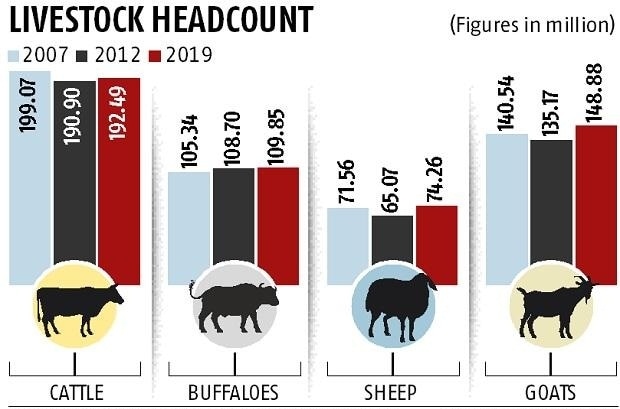CURRENT AFFAIRS
Get the most updated and recent current affair content on Padhaikaro.com
The Livestock Census
- Vaid's ICS, Lucknow
- 16, Aug 2021

Why in News?
Who conducts the Livestock Census?
- The Livestock Census has been conducted in the country periodically since 1919-20. Since then it has been conducted once every 5 years.
- It is released by Ministry of Fisheries, Animal Husbandry and Dairying.
- It covers all domesticated animals and their headcounts.
- So far 19 such censuses have been conducted by the Ministry of Fisheries, Animal Husbandry and Dairying, in participation with State Governments and UT Administrations.
- The household-level data through online transmission from the field has been used for the first time in 20th Livestock Census.
- The census is beneficial not just for policymakers but also for agriculturists, traders, entrepreneurs, dairying industry and masses in general.

- There are 4.85 crore desi (native) milch cows in the country, less than 1% higher than the 4.81 crore population in the last census in 2012.
- On the other hand, the milch population of exotic and crossbred cattle — including varieties such as Jersey or Holsteins which have much higher milk yields — saw a whopping growth of 32% over the last seven years, growing from 1.9 crore to 2.5 crore animals.
- Milch cattle are cows kept for the purpose of milk production. Among this category, therefore, foreign breeds now have a population that is more than half the population of desi breeds.
- The Rashtriya Gokul Mission, launched by government in 2014, aimed to promote indigenous desi breeds. However, the total population of such cattle — male and female together, milk-producing or not — actually dropped 6% to 14.2 crore animals, while exotic and crossbred cattle saw an overall growth of almost 27% to 5 crore animals.
Facts for Prelims:
‘Rajiv Gandhi Award for Excellence in Information Technology:’
- Recently, the Government of Maharashtra has announced the introduction of ‘Rajiv Gandhi Award’ for excellence in ‘Information Technology’.
- This award will be given to institutions and companies for their outstanding performance in the field of information technology on the occasion of the birth anniversary of former Prime Minister Rajiv Gandhi, August 20.
Equivalent levy:
(Equalization Levy)
- This tax is based on the principle that a seller in the digital world can engage in business transactions without any physical presence and that governments have a legitimate right to impose such transactions.
- Equivalent levy was introduced by the Government of India in the year 2016.
- It was imposed on the revenue generated as a result of business-to-business digital advertisements and related services from resident service providers.